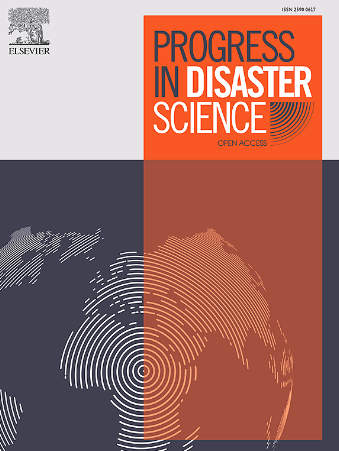Human dimensions in flood risk management: Exploring risk perception and climate change considerations among engineers in the US
IF 3.8
Q3 ENVIRONMENTAL SCIENCES
引用次数: 0
Abstract
Due to an increase in natural hazards, the cost of physical damage to local infrastructure has grown significantly. However, many vulnerabilities faced by the built environment involve human factors, which remain understudied. This study examines factors that influence how hydraulic and coastal engineers involved in U.S. flood infrastructure design perceive risk and integrate environmental and social considerations into their professional recommendations. A survey was conducted of U.S.-based civil engineers specializing in flood infrastructure design to assess factors influencing their design-related judgments. Using various statistical analyses, this study identifies key predictors shaping engineers' engagement with risk and climate. Results show that engineers with liberal political orientations are more likely to incorporate climate change impacts into designs, and household income is negatively associated with risk-aversion attitudes. Engineers with limited work experience report more influence from peers, and dissatisfaction with engineering education is a strong predictor of reliance on personal attitudes when facing uncertainty. While engineers are not the final decision-makers, these findings highlight their crucial role as intermediaries who shape how risk is framed and which options are presented to agencies and clients. These findings offer novel contributions merging social science with engineering and inform how decision-makers can enhance flood risk management.
洪水风险管理中的人类维度:探索美国工程师的风险感知和气候变化考虑
由于自然灾害的增加,对当地基础设施造成的物理破坏的成本大大增加。然而,建筑环境面临的许多脆弱性涉及人为因素,这些因素仍未得到充分研究。本研究考察了影响美国洪水基础设施设计的水利和海岸工程师如何感知风险,并将环境和社会因素纳入其专业建议的因素。对美国专门从事防洪基础设施设计的土木工程师进行了一项调查,以评估影响他们设计相关判断的因素。通过各种统计分析,本研究确定了影响工程师参与风险和气候的关键预测因素。结果表明,具有自由政治倾向的工程师更有可能将气候变化影响纳入设计中,家庭收入与风险厌恶态度呈负相关。工作经验有限的工程师受到同行的影响更大,对工程教育的不满是面对不确定性时依赖个人态度的一个强有力的预测因素。虽然工程师不是最终的决策者,但这些发现突显了他们作为中间人的关键作用,他们决定了风险的构成方式,以及向机构和客户提供哪些选择。这些发现提供了将社会科学与工程相结合的新贡献,并告知决策者如何加强洪水风险管理。
本文章由计算机程序翻译,如有差异,请以英文原文为准。
求助全文
约1分钟内获得全文
求助全文
来源期刊

Progress in Disaster Science
Social Sciences-Safety Research
CiteScore
14.60
自引率
3.20%
发文量
51
审稿时长
12 weeks
期刊介绍:
Progress in Disaster Science is a Gold Open Access journal focusing on integrating research and policy in disaster research, and publishes original research papers and invited viewpoint articles on disaster risk reduction; response; emergency management and recovery.
A key part of the Journal's Publication output will see key experts invited to assess and comment on the current trends in disaster research, as well as highlight key papers.
 求助内容:
求助内容: 应助结果提醒方式:
应助结果提醒方式:


